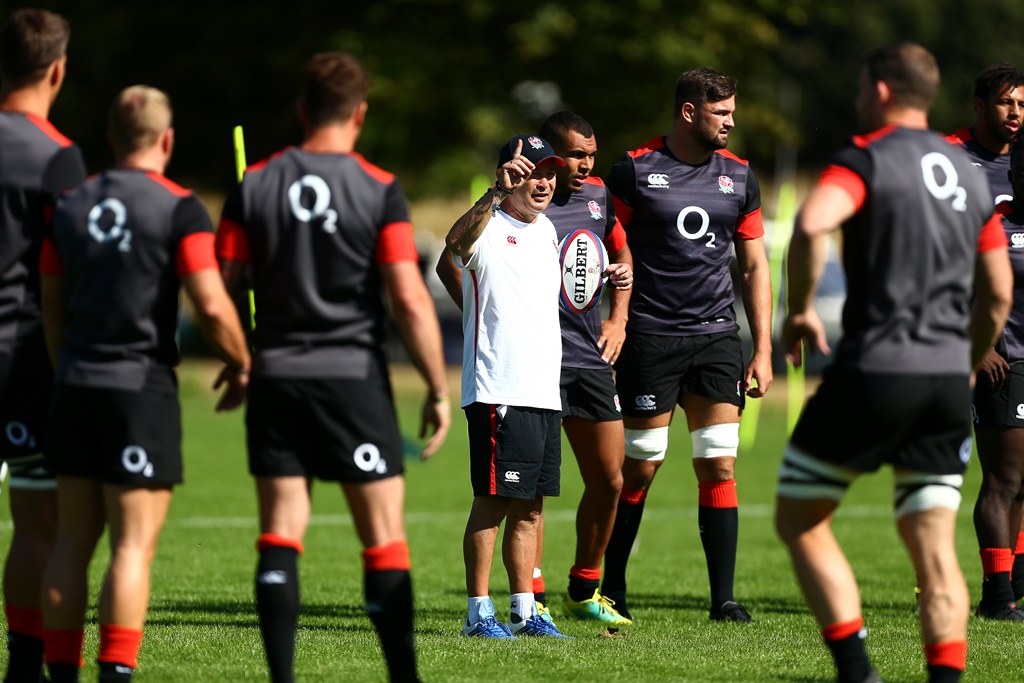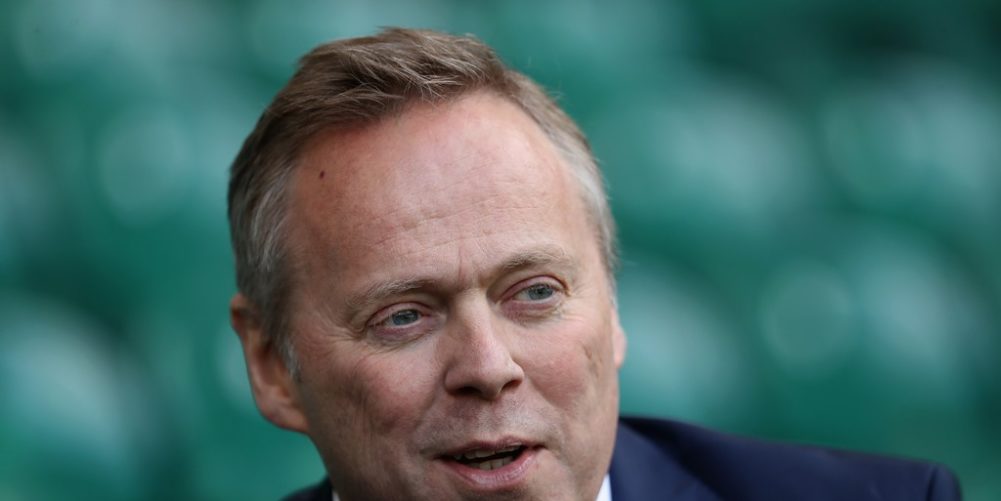By Nick Cain
STEVE Brown has taken so much flak over the past year that it would be no surprise if he took to walking through the RFU‘s Twickenham headquarters wearing a hard hat.
However, this week the RFU’s chief executive came out fighting. In an exclusive interview with The Rugby Paper, Brown refuted the barrage of criticism aimed at him on a host of core policies, and asserted that, “the RFU are in a very strong position”.
Brown has taken incoming fire from all directions, and until now has kept his head down after being blasted on subjects ranging from the alarming slump in the England team’s fortunes under Eddie Jones to financial and organisational mismanagement.
As our front page story highlights, Brown started his counter-offensive by offering his unequivocal support to England head coach Jones. In a move likely to spark more controversy he said that the RFU would back Jones through to the World Cup “come what may” in terms of results in the Autumn series, the Six Nations, and the 2019 World Cup warm-up matches.
Brown also says that it is inaccurate to pillory the RFU for squandering a £30m treasure trove from 2015 World Cup profits, to the extent that they have been forced to make a ten per cent cut in the RFU work force. He could be termed an expert witness, given that the kudos he gained from delivering that World Cup windfall as the RFU’s financial director led to him being appointed their chief executive just over a year ago.
Brown and company have faced further criticism for a £28m increase in the costs of their East Stand development at Twickenham, taking the price from an initial costing of £53m to an eye-watering £81m. The RFU boss claims that the huge hike was unavoidable because of new building regulations introduced since the Grenfell Tower disaster.
In August this led to Brown being targeted from within by a group of past RFU presidents, with former CEO Francis Baron in the vanguard. Baron delivered a 40-page report in August which criticised Brown for a lack of due diligence on the East Stand project and cited additional fiscal misjudgements.
Brown refutes the East Stand charges categorically. He says that the first increase from a £53m sign off to £65m fit-for-purpose design was predictable in such a large scale stadium redevelopment. However, he says that with the building underway, everything changed radically when new regulations relating to Grenfell, and to anti-terrorism, were introduced.
“The world changed in terms of building in the UK overnight. Steelwork which had 16 bolts had to be pushed up to 64, and then all the bomb-blast protection in panelling and glass…and with new access and egress routes for the Fire Brigade having to be introduced.”
Brown says: “It was originally classified by the building regulators as an extension to an existing building, then it changed overnight and became a brand new building, and we had to change all of the design spec. We challenged it up to a point because of cost implications, but you have to be careful because you are arguing against updated contemporary fire safety. Do we actually want to be challenging that?”

He continues: “We are talking about 6,700 people in that new building when it’s full, so actually we have to trust the experts’ judgement because we have to protect the people in there…would I sleep well at night if we’d fought that and won, and we were compromised if we had something happen? I don’t think I would.”
Brown recognises that the £28m increase is “massive”, but says that the RFU had no choice: “Safety as an event holder is paramount, especially when you are bringing the size of two towns-worth of people to a stadium.”
Brown states also that the East Stand build, much of which is to increase corporate hospitality facilities, is financed by “capital money” and covered by a $100m unsecured loan from RBS “at a very favourable rate”. He says it will be repaid completely by 2025. “The East Stand, despite its overspend, will pay for itself in terms of how much money it returns in seven years.”
His critics will keep an eagle eye on that forecast. However, Brown’s hand is strengthened because he is proportionate in his comments about fiscal management on his watch, conceding that there are some areas in which the RFU might have dropped their guard.
He acknowledges, for example, that the Professional Game Agreement (PGA) between the Premiership clubs and the RFU in 2016, which cost the Union £220m over eight years, might have been too much for international player release. This has been highlighted by the recent £275m bid floated by the private equity firm CVC for a 51 per cent share of the entire Premiership.
Asked whether the RFU had got value for money from the PGA deal , Brown said that at the time, “we paid the right amount of money because that’s what the market was telling us.”
Reflecting on the changed financial climate since then he says now: “If we look at it today, in a slightly tighter position, would we look back and say we made the wrong decision? I think the answer’s no. But would we have looked at it slightly differently if we’d known the world was getting tighter, then maybe we would have – but that’s hindsight, and we can’t do much about that.”
Brown argues that the RFU were duty-bound to build a more co-operative model with the clubs, and that it also had to take into account club salaries rocketing by 50 per cent. “We were trying to achieve better access and a balance of control with the clubs, and, frankly, to build a much stronger, positive relationship because we’re sharing the top 35 players. They are exposed to most of the games in top competitions for country or club… so we needed to be cogniscent of what a player was costing.”
Brown reveals that in stark contrast to the rampant inflation in player wages, projections of a tighter broader fiscal environment were instrumental in his decision to axe jobs at the RFU, cutting the staff from 575 to 521. He says: “We put 78 people at risk, but after the consultation process we made 63 positions redundant – and only 54 people left. It was right across the board, so we have fewer accountants, fewer lawyers, fewer HR people, fewer technology people, and fewer rugby people.”
He adds: “Although 50 per cent of those who left were from community rugby we still have 225 people involved in our community field force, and they are by a long way our biggest department.”
Despite it sitting badly against the austerity measures at Twickenham, Brown says that the market rate at club level has also influenced the RFU’s decision to raise England squad match fees to £23,000 per game, which is easily the highest for any national team.
He says that a potential £230,000 England player salary over ten games would be dependent on a win bonus element, and that, “the increase was actually lower than the average club wage, which in the last six years has doubled”.
Brown is also adamant that despite a spate of adverse publicity the RFU are in robust health. “Nothing has gone wrong, we haven’t lost any money, and we’re not in a terrible place. In fact, we’re in a super place. From a financial balance sheet, we have good cash flow in the business.”
However, he says the commercial and sponsorship landscape could be less rosy in the short term: “One thing we have looked forward at is what does the world look like in the next four year cycle? When we look at the sectors – retail, telecoms, broadcast – all those companies are changing in terms of how and where they invest, so we decided that we should take a reduction.
“We made the decision based on a few key things. There was a big broadcast deal in football where we saw £100m come off it, which is a big number. We saw some of the pressure on the Six Nations with sponsorship, and in European (Cup) rugby, and in other sports across the world. So, the strategy that the RFU Board and Council agreed with is that we should tighten our belts now.
“We could have kicked the can down the road because we’re in a strong position, but it is for us to be prudent because what we don’t want to do is take more drastic action. That’s something that personally I’ve had to make a call on, and politically it’s not been very popular, but somebody had to do it at some point.”
Brown says that prudence measure will amount to a £4-5m reduction in the RFU’s £100m annual spend, which over the last decade has seen the professional game get a 60 per cent allocation to the community game’s 40 per cent.
He says the split between the professional and amateur sectors is determined by the RFU’s “virtuous circle” income stream: “We need to invest well in the professional game to generate the revenues that we do.”

Brown speaks as one of the key RFU strategists in what he calls “the golden years” from 2011 until 2017. When he joined the Union in 2011 it was at a low ebb following England’s dismal World Cup campaign, but he says it was also a great opportunity for regeneration.
“What was clear to all of us who were brand new at that time was here was a fantastic product (rugby) with fantastic values that was not fully tapped.That’s when we went to the markets commercially and really started to grow that side of the game.”
Brown says that the growth rate was exceptional, with the income invested in the game by the RFU going from £200m in the four year cycle ending in 2012 rising to £315m in 2016, with a £430m spend earmarked for 2020.
Brown says: “We just kept growing. Every time we went back to the broadcast or the sponsorship market we saw significant growth year on year…what really shifted in that golden period was companies identifying with the social responsibility embodied by what we do, in terms of money being ploughed back into the grass-roots game.”
He cites RBS, O2 and Canterbury as examples and says: “We are selling English rugby as much as we are England.”
Brown argues that, despite forecasts of economic turbulence, the England rugby ‘brand’ is in good shape, and the RFU’s recent announcement of British Airways as a main sponsor and first principal partner of Twickenham stadium, reinforces that claim.
“The net-net position is that we’ve gone up, and this Autumn it couldn’t be better for a rugby fan. All four games are sold out, and we continue to sell-out. We have between 2.5 and 3 million people trying to buy a ticket to come here, and that says to me there is something extremely attractive about international rugby, and a whole interest in the sport generally.”
The net-net position is also that as long as England reward Brown’s optimism with high-quality winning rugby at Twickenham this Autumn, he will be able to put his hard-hat away for a bit.
The Rugby Paper is on sale all year round! It’s time to get ready for the autumn internationals. Subscribe: http://bit.ly/TRP-Sub
























